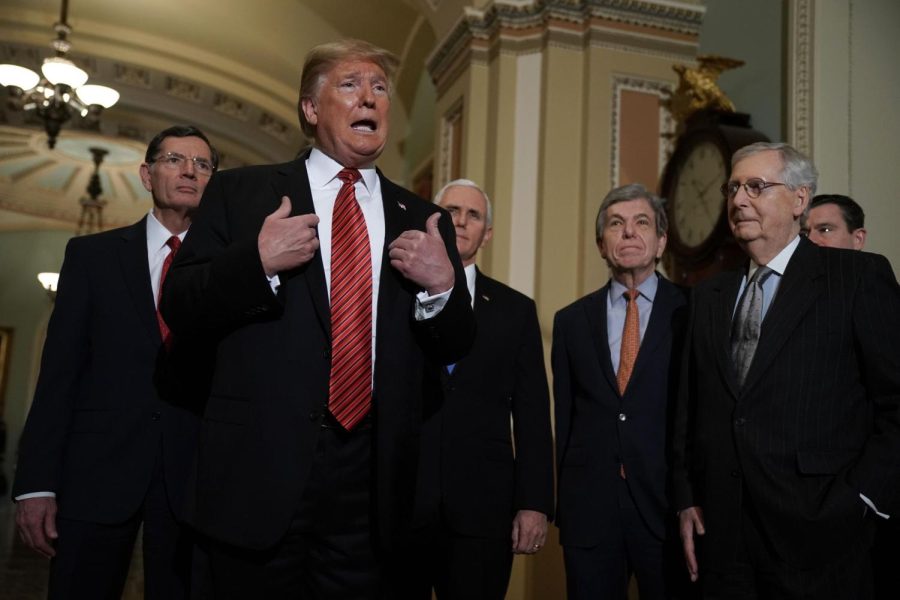Republicans back Senate rule change to speed confirmations of Trump nominees
February 13, 2019
(CNN) — A bitterly divided Senate committee Wednesday approved on a party line vote changes to Senate rules that will allow the Republican majority to speed confirmations of most of President Donald Trump’s nominees.
Republicans backed the proposal, which would limit debate time on nominees, arguing during a spirited session of the Senate Rules Committee that it was the only way to overcome what they described as unprecedented obstruction by Democrats of Trump’s executive branch and judicial appointments.
The full Senate would need to approve the plan before it takes effect. No vote has yet been scheduled. But Republicans are also weighing using the “nuclear option” to force the change over the objection of Democrats. Such a move would further inflame Democrats because it would lower the threshold for a rule change to a simple majority.
If adopted, the rule changes would lower from 30 hours to two hours the debate time allowed once a filibuster has been defeated. The change would apply to almost all judicial and executive branch nominees but not picks for high-level positions, such as Cabinet officials, federal appellate court judges and the members of the Supreme Court.
Senate Rules Chairman Roy Blunt, a Republican of Missouri who sponsored the measure, said Trump’s nominees have faced 128 filibusters by Democrats, many more than the nominees of the several presidents before Trump did combined.
“Presidents deserve to have their teams in place,” Blunt said, noting the changes would apply even if a Democrat won the White House in 2020. “Never before have we seen the level of obstruction in the confirmation process in the first two years of a presidency.”
Republicans are also weighing using the “nuclear option” to force the change on the Senate floor over the objection of Democrats. Such a move would further inflame Democrats because it would let Republicans make the rule change with a simple majority vote instead of a super majority typically required for a change of Senate rules.
Democrats bristled at the proposal, arguing that despite complaints about the minority party slow-walking nominees by often maximizing allowable debate time for them, both Trump and the Republican majority leader of the Senate, Mitch McConnell of Kentucky, have boasted about the record number of district court and appeals court judges that have been confirmed during Trump’s first two years in office.
Sen. Amy Klobuchar of Minnesota, the top Democrat on the committee, said the “legislation will remove important checks and balances from the nomination process, making it harder to properly vet but easier to confirm unqualified nominees.”
“At a time of blistering rhetoric, anger, and divisiveness, this is no time to cede this chamber’s ability to do its due diligence by removing the guardrails that help ensure judicial nominees have the qualifications for lifetime appointments to the federal bench,” said Klobuchar, who is also running for the Democratic presidential nomination. “The Senate’s constitutional duty of advise and consent is too important to turn into a mere rubber stamp.”
The Democratic opposition came despite their support for a rules change in 2013 when they were in the majority and reached a temporary agreement with Republicans to speed debate for President Barack Obama’s nominees using similar tools to the ones passed by the committee.
McConnell, who is also a member of the committee, acknowledged that the “real crisis” is with executive branch appointments because Democrats have made it hard for him to get large numbers of sub-Cabinet nominees confirmed, leaving many vacancies in the federal agencies. That led Democrats on the committee to question why the rule change shouldn’t be limited to administration appointments and not involve judges who are appointed for life and therefore worthy of additional scrutiny.
Before turning to the nuclear option, Blunt has said Republicans want to give Democrats a chance to reach a bipartisan agreement to speed up approvals of nominees, something that seems unlikely following the 10-9 vote in committee.
GOP leaders haven’t said when they might turn to it but have indicated it will be soon.
Democrats first used the nuclear option in 2013 to lower the vote threshold from 60 votes to a simple majority of senators needed to defeat a filibuster of most of presidential nominees except those for the Supreme Court. Republicans later changed it include nominees to the high court.
The-CNN-Wire
™ & © 2019 Cable News Network, Inc., a Time Warner Company. All rights reserved.













